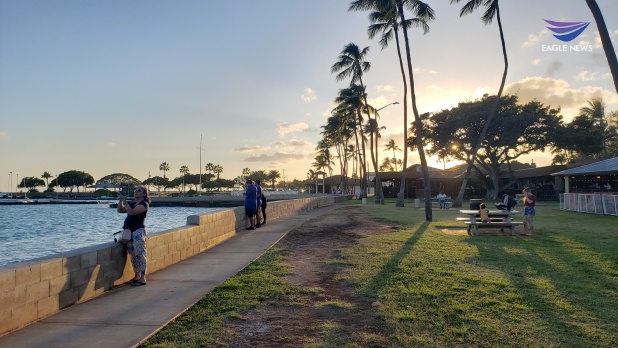
HONOLULU (Eagle News) — In one of the few Hawaii statewide resident surveys on tourism not sponsored by the Hawai’i Tourism Authority or by the State Department of Business, Economic Development, and Tourism, a majority of Hawaii’s residents responded in favor of capping the number of visitors to the islands and would be happy to see tourists charged when visiting Hawaii’s attractions.
The University of Hawaii’s (UH) Public Policy Center (PPC) administered the survey online from April 16 to May 3, 2021. A total of 700 Hawaii residents completed the survey.
“Hawai‘i residents have long had a complicated relationship with the visitor industry,” said the UH-PPC study. “Although tourism generates tax revenue and jobs, there are longstanding concerns about the impact on Hawai‘i’s natural resources and day-to-day quality of life. These voices of concern reached a crescendo when visitor arrivals peaked at 10 million in 2019.”
According to the study, 52% prefer limiting the number of visitors, with even stronger support among neighbor island and Native Hawaiian residents. Residents also prefer to see tourists charged and/or required to make advance reservations at parks or other “hot spots,” with 78% strongly favoring or somewhat favoring charging visitors an entry fee to use them during peak times.
As for government involvement, a strong consensus of residents feel the State should play a role in managing the tourism industry. Residents by a 2-to-1 margin said the state should control or regulate tourism more than other businesses. Seventy-five percent support regulating vacation rentals outside resort areas while 52% opposed allowing casino gambling.
When given a choice on whether Hawaii should focus on tourism recovery or economic diversification, survey participants want the state to focus on both equally (49%). However, those choosing just one went strongly with diversification (37%) over tourism recovery (10%).
Many residents also support using rental car surcharges to pay to address tourism impacts and favor green fees, which are visitor taxes specifically for natural resource protection.
The survey also touched on Covid-19 and the pandemic’s effect on the Hawaii tourism industry.
Fifty one percent of respondents rate the state’s performance to limit COVID-19 threats from travel as “fairly bad” and another 6% just “bad.” Forty-five percent want both vaccination and testing requirements for travelers to and from Hawaii while 67% want the quarantine requirements the same for all four counties.
“This is an important topic for our state right now as the tourism industry re-emerges from the COVID-19 pandemic,” said PPC director Colin Moore. “I hope these results will lead to thoughtful conversations about how we can restructure tourism governance.”
Located in the College of Social Sciences, the University of Hawaii Public Policy Center provides opportunities for students, faculty, and the community to study, research and be involved in policy oriented initiatives and projects. The PPC conducts policy analyses and research designed to solve complex social problems, and it facilitates community-based dialogs and forums on policy topics of interest.
The UH-PPC contracted Anthology Research to field the survey using an online methodology. Th e margin of error for a sample of this size is +/- 3.70 percentage points with a 95% con dence level.
(Eagle News Service, with reports from Alfred Acenas, EBC Hawaii-Pacific Bureau)
